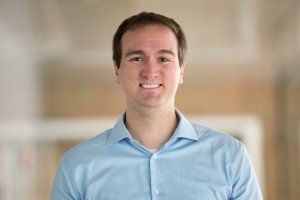Presented By: Michigan Engineering
Aerospace Chairs Distinguished Speaker Series
U-M Mechanical Engineering Assistant Professor Aaron Towne: "Resolvent-based estimation and control of turbulent flows"

Thursday, January 19 at 3PM
Boeing Lecture Hall (1109 FXB) and Zoom at https://umich.zoom.us/J/97552260747
About this lecture:
Flow estimation and control provide a path forward toward achieving many important engineering objectives, such as decreasing drag, delaying flow separation and transition, and reducing flow-generated noise. While state estimation and control are classical topics in dynamical systems and control theory, standard methods have several disadvantages when applied to turbulent flows, including high cost and restrictions in their ability to incorporate key physics. In this presentation, I will describe an alternative framework for optimal flow estimation and control formulated in terms of resolvent operators obtained from the Navier-Stokes equations, which have been shown to efficiently describe organized motions within turbulent flows. The resolvent-based framework provides a hierarchy of methods for different tasks, including space-time statistical modeling, flow-field reconstruction in the time domain, real-time causal estimation, and control. When equivalent assumptions are made, the causal resolvent-based estimator and controller reproduce the Kalman filter and LQG controller, respectively, but at substantially lower computational cost. Unlike these methods, the resolvent-based approach can naturally accommodate forcing terms (nonlinear terms from Navier-Stokes) with colored-in-time statistics, which significantly improves the accuracy of the estimates. Moreover, the use of the resolvent framework facilitates physical interpretation of the mechanisms involved in the estimation and control procedure in terms of coherent flow structures. The performance of the resolvent-based methods is demonstrated using several example problems including the flow over a backward-facing step, an airfoil, and a turbulent channel flow.
Speaker Bio:
Aaron Towne is an Assistant Professor in the Department of Mechanical Engineering at the University of Michigan. His research develops reduced-complexity models that can be used to understand, predict, and control turbulent flows, using both physics-based and data-driven methods. Applications include aeroacoustics, aerodynamics, and wall-bounded flows, among others. Before joining the faculty at Michigan, he was a Postdoctoral Fellow in the Center for Turbulence Research at Stanford University. He received his PhD and MS degrees from the California Institute of Technology and his BS from the University of Wisconsin-Madison. He is a recipient of a 2022 National Science Foundation (NSF) CAREER Award, the 2020 Young Investigator Program Award (YIP) from the Air Force Office of Scientific Research (AFOSR), and multiple best paper awards from the American Institute of Aeronautics and Astronautics (AIAA) and American Society of Mechanical Engineers (ASME).
Boeing Lecture Hall (1109 FXB) and Zoom at https://umich.zoom.us/J/97552260747
About this lecture:
Flow estimation and control provide a path forward toward achieving many important engineering objectives, such as decreasing drag, delaying flow separation and transition, and reducing flow-generated noise. While state estimation and control are classical topics in dynamical systems and control theory, standard methods have several disadvantages when applied to turbulent flows, including high cost and restrictions in their ability to incorporate key physics. In this presentation, I will describe an alternative framework for optimal flow estimation and control formulated in terms of resolvent operators obtained from the Navier-Stokes equations, which have been shown to efficiently describe organized motions within turbulent flows. The resolvent-based framework provides a hierarchy of methods for different tasks, including space-time statistical modeling, flow-field reconstruction in the time domain, real-time causal estimation, and control. When equivalent assumptions are made, the causal resolvent-based estimator and controller reproduce the Kalman filter and LQG controller, respectively, but at substantially lower computational cost. Unlike these methods, the resolvent-based approach can naturally accommodate forcing terms (nonlinear terms from Navier-Stokes) with colored-in-time statistics, which significantly improves the accuracy of the estimates. Moreover, the use of the resolvent framework facilitates physical interpretation of the mechanisms involved in the estimation and control procedure in terms of coherent flow structures. The performance of the resolvent-based methods is demonstrated using several example problems including the flow over a backward-facing step, an airfoil, and a turbulent channel flow.
Speaker Bio:
Aaron Towne is an Assistant Professor in the Department of Mechanical Engineering at the University of Michigan. His research develops reduced-complexity models that can be used to understand, predict, and control turbulent flows, using both physics-based and data-driven methods. Applications include aeroacoustics, aerodynamics, and wall-bounded flows, among others. Before joining the faculty at Michigan, he was a Postdoctoral Fellow in the Center for Turbulence Research at Stanford University. He received his PhD and MS degrees from the California Institute of Technology and his BS from the University of Wisconsin-Madison. He is a recipient of a 2022 National Science Foundation (NSF) CAREER Award, the 2020 Young Investigator Program Award (YIP) from the Air Force Office of Scientific Research (AFOSR), and multiple best paper awards from the American Institute of Aeronautics and Astronautics (AIAA) and American Society of Mechanical Engineers (ASME).